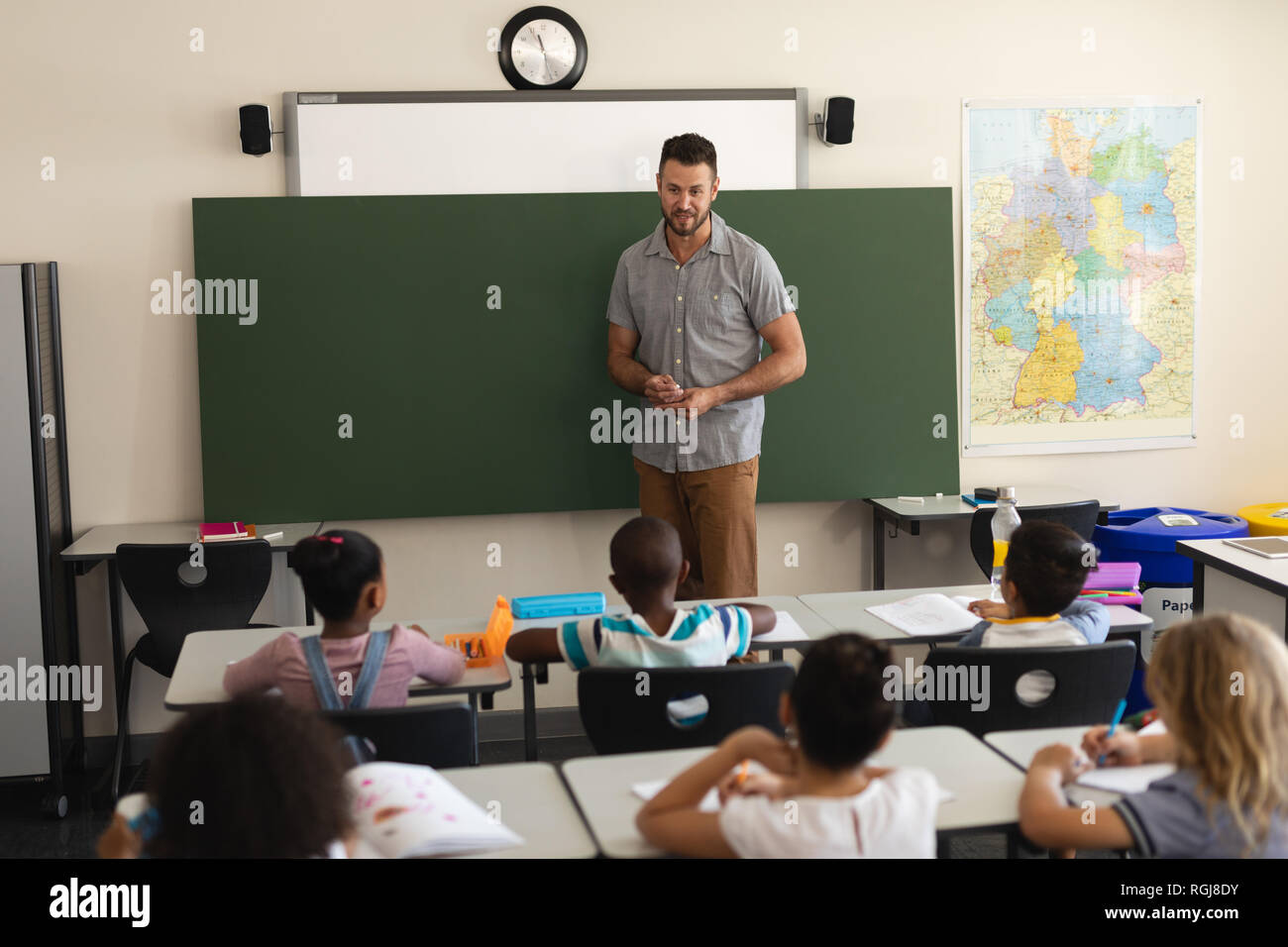Top Primary Science Tuition Singapore to Help Your Child Excel
Top Primary Science Tuition Singapore to Help Your Child Excel
Blog Article
Discover the Crucial Benefits of Comprehending Key Science for Young Students
The relevance of key science education for young learners extends much beyond simple knowledge acquisition; it offers as a basic pillar in developing important skills such as critical reasoning, analytical, and creativity. Involving with clinical ideas through inquiry-based and interactive tasks not only cultivates curiosity but also lays the groundwork for resilient, positive learners.
Enhancing Important Believing Skills
Fostering important thinking abilities in young learners is necessary for their cognitive advancement and future scholastic success. Critical reasoning allows children to examine information, review evidence, and make educated decisions, which are crucial abilities in today's information-rich society. By taking part in scientific questions, young learners can improve these abilities as they check out principles with experimentation, monitoring, and reasoning.
In primary scientific research education and learning, educators can promote vital thinking by encouraging trainees to ask concerns, develop theories, and carry out experiments. This hands-on technique enables children to practice problem-solving and develop logical reasoning skills. For instance, when students investigate the properties of materials or the principles of movement, they find out to assess their findings critically and reason based on proof.
Furthermore, discussions and joint projects can promote important thinking by giving possibilities for students to articulate their thoughts, challenge presumptions, and take into consideration varied viewpoints. By producing a helpful environment that values questions and representation, teachers can nurture critical assuming abilities that equip young learners to come to be long-lasting students and independent thinkers. Eventually, enhancing these abilities lays a robust foundation for their future academic undertakings and personal development.
Cultivating Interest and Exploration

Key science education supplies an organized atmosphere where young students can check out numerous phenomena with hands-on experiments and monitorings. By enabling them to connect with materials and take part in inquiry-based knowing, instructors create chances for youngsters to develop theories, evaluate their concepts, and draw final thoughts. Such experiences support a sense of marvel and exhilaration about science.

Structure Self-confidence in Trouble Resolving
Structure self-confidence in problem-solving is a critical component of key science education and learning that equips young learners to approach difficulties with resilience and creativity - primary science tuition Singapore. They develop vital skills in important reasoning and evaluation when youngsters are encouraged to involve with clinical principles via hands-on tasks and inquiry-based discovering. This process not only enhances their understanding of clinical principles yet likewise fosters a feeling of ownership over their learning
To construct confidence, educators need to produce a helpful environment where mistakes are watched as possibilities for growth instead of failings. This motivates pupils to take dangers and explore various remedies to issues. By providing scaffolding and advice, instructors can assist trainees browse complicated tasks, gradually increasing their freedom in analytical scenarios.
Furthermore, collective learning experiences, such as group tasks or experiments, can additionally improve trainees' confidence as they discover to verbalize their ideas and listen to others' viewpoints. These communications support social abilities and enhance the concept that analytical is typically a collective endeavor. Eventually, cultivating self-confidence in analytic prepares young students for future scholastic obstacles and outfits them with the devices necessary for lifelong knowing.
Motivating Creativity and Advancement
In the world of main scientific research education and learning, urging creativity and development is necessary for growing a dynamic knowing environment. By promoting a society where young learners can discover ideas and experiment freely, instructors help pupils establish vital thinking abilities and a passion for exploration. Imagination in scientific research motivates youngsters to ask concerns, develop hypotheses, and take part in hands-on activities that promote their imagination.
Incorporating open-ended tasks and inquiry-based discovering into the educational program enables pupils to reveal their unique viewpoints and options. For circumstances, when charged with fixing an issue associated to their environment, pupils can brainstorm multiple strategies, causing inventive outcomes that display their creativity. This not only grows their understanding of clinical principles but also imparts a feeling of possession over their learning process.
Moreover, imaginative science education and learning supports collaboration among peers, as trainees usually share ideas and build on one an additional's understandings - primary science tuition Singapore. This collective spirit advertises not just innovation but likewise necessary social abilities. Thus, by prioritizing creativity and development in primary science education and learning, we empower young learners to assume seriously, embrace difficulties, and picture possibilities, laying a strong foundation for lifelong understanding and expedition
Preparing for Future Learning Obstacles
Young students' ability to navigate future discovering obstacles depends upon a strong structure in main scientific research education. This foundational understanding outfits trainees with vital believing skills and a systematic strategy to analytic, necessary for taking on complicated problems in an ever-evolving world. Key science fosters inquiry-based understanding, urging pupils to ask concerns, check out hypotheses, and participate in hands-on experiments.
As they establish these abilities, students end up being next page proficient at evaluating data, identifying patterns, and attracting informed conclusions. Such competencies are crucial not only in clinical fields but additionally in modern technology, mathematics, and engineering (STEM), where interdisciplinary understanding is increasingly vital.
Moreover, main scientific research education and learning cultivates a sense of interest and strength in young students, allowing them to see obstacles as opportunities for growth. As they run into and overcome challenges in their clinical expeditions, they construct confidence in their ability to adapt and innovate.
Eventually, a solid structure in key scientific research not just prepares young students for scholastic pursuits but likewise furnishes them with the devices necessary for long-lasting discovering and versatility in a quickly altering worldwide landscape. By investing in primary science education, we are spending in the future possibility of our students.
Verdict
Recognizing key scientific research is crucial for young learners, as it fosters critical reasoning, inquisitiveness, and creativity. Involving with clinical principles via hands-on experiments improves analytical capabilities and develops resilience. This fundamental expertise not only equips students to examine information and identify patterns but additionally nurtures an inquiry-based way of thinking. Inevitably, the advantages of main scientific research education and learning prepare kids for future academic searches and instill long-lasting knowing habits necessary for prospering in an ever-evolving globe.
The significance of key science education for young learners expands far beyond plain knowledge purchase; it offers as a basic pillar in establishing essential skills such as essential thinking, analytical, and creativity. By producing an encouraging environment that values query and Website reflection, teachers can support vital assuming skills that encourage young learners to end up being independent thinkers and long-lasting students. Therefore, by prioritizing imagination and innovation in main science great post to read education and learning, we empower young students to think critically, welcome obstacles, and picture opportunities, laying a solid structure for lifelong knowing and exploration.
Young learners' capability to browse future understanding obstacles pivots on a strong structure in primary science education.Comprehending primary science is important for young learners, as it promotes important reasoning, curiosity, and imagination.
Report this page